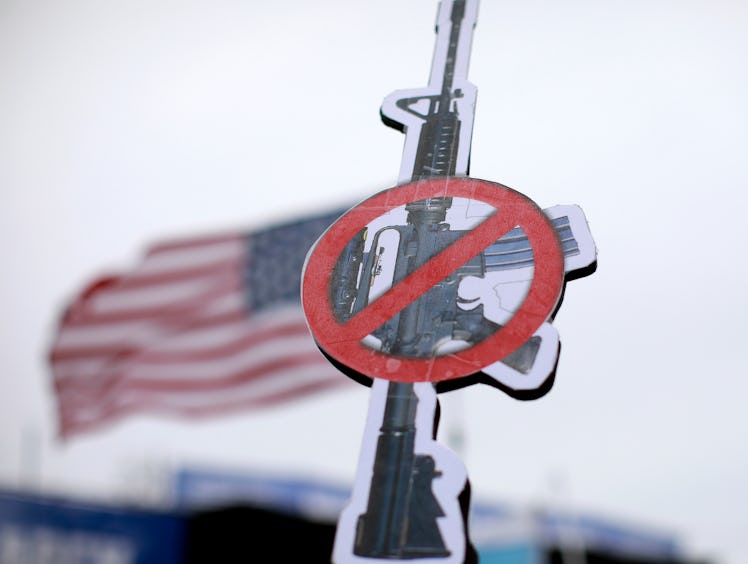
Texas & Ohio Don't Have The Strictest Gun Laws Out There
Between Aug. 3 and Aug. 4, at least 31 people were killed in total after two mass shootings in Dayton, Ohio and El Paso, Texas. Gun control has been a heated conversation in the United States for years, but the recent massacres has kicked the topic into high-gear. Activists have pushed for stricter gun laws across the nation, but what are the gun laws in Texas and Ohio? Here's a rundown.
On Aug. 3, an armed gunman opened fire in an El Paso, Texas shopping center and killed 22 people. Several other people were wounded. Then, not even 24 hours later on Aug. 4, another mass shooting in Dayton, Ohio killed nine people. According to the Gun Violence Archive, a trackers which monitors shootings in the United States, as of Aug. 6 there have been more than 250 mass shootings in 2019, which means that there's been more shootings in the U.S. than days this year.
In the aftermath, many people are calling on leaders to tighten gun laws, and even some of the leaders themselves have spoken in support of stricter laws, including background checks and red flag laws. In Ohio, Gov. Mike DeWine pushed for red flag laws and better background checks, while President Donald Trump addressed the shootings by promoting red flag laws in an Aug. 5 press conference. In addition, The New York Post shared an article by the Editorial Board on Sunday, Aug. 4 which pushed to ban assault weapons in the country.
But what about the laws already on the books? Gun laws vary a lot from state to state, so it makes sense to wonder about the gun laws in Ohio and Texas. Here's what to know.
Texas
According to ABC News, Texas is a "shall-issue" state, which means that law enforcement cannot deny a gun applicant a permit as long as they're over 21 years old and pass basic requirements, such as no criminal charges. The state also allows open carry as well as concealed carry, meaning residents may carry firearms in public. However, gun owners who want to carry their firearms in public must have a License to Carry issued by the state or another state with reciprocity. To carry a concealed weapon, they have to pass a four to six hour training course and exams, according to the U.S. Concealed Carry Association, a gun owner's association.
Per the gun safety advocacy group the Giffords Law Center to Prevent Gun Violence, Texas gun laws do not regulate possession of assault weapons or large caliber rifles. However, Texas law prohibits possessing a machine gun.
Texas does not have a law that requires gun owners to register their guns, report lost or stolen firearms, or obtain a license to own one. There is currently no law on a limit to how many firearms an individual can purchase or a waiting period to obtain a firearm.
Under federal law, Texas residents buying a gun from a licensed seller must go through a background check. Private sales, like those between individuals, do not require a background check.
Residents who have been "involuntarily committed to any mental institution" are prohibited from purchasing firearms. However, Texas does not require these individuals be reported to National Instant Criminal Background Check System (NICS).
The state holds an "F" gun law grade from the Giffords Law Center.
Ohio
Like Texas, Ohio also allows concealed carry and is a "shall-issue" state, per the Giffords Law Center. The state allows open carry without a permit (except in cars or places selling alcohol), while concealed carry requires a permit, per the U.S. Concealed Carry Association.
The state allows residents to possess assault weapons, 50-caliber rifles, and non-powder guns. Machine guns are defined as "unlawful ordinances," and therefore are considered unlawful without a permit. However, sheriffs, safety directors, or police officials can issue permits to residents who are considered "responsible" and is used for a "proper purpose."
Under federal law, people buying guns from licensed dealers in Ohio must undergo a background check. However, Ohio does not require background checks for "private sales" between individuals. The state does not require a waiting period to purchase a firearm or ammunition.
Anyone who was involuntarily committed to a mental health facility is prohibited from purchasing a firearm, but like Texas, Ohio law does not require these individuals' identities be disclosed to NCIS.
However, Ohio gun owners who lose their firearm or have it stolen are required by law to report it missing.
The state holds a "D" gun law grade from the Giffords Law Center.
While gun laws vary state by state, these two states are clearly on the less restrictive end of the scale. However, considering the heightened conversation about gun control, you never know what may change.